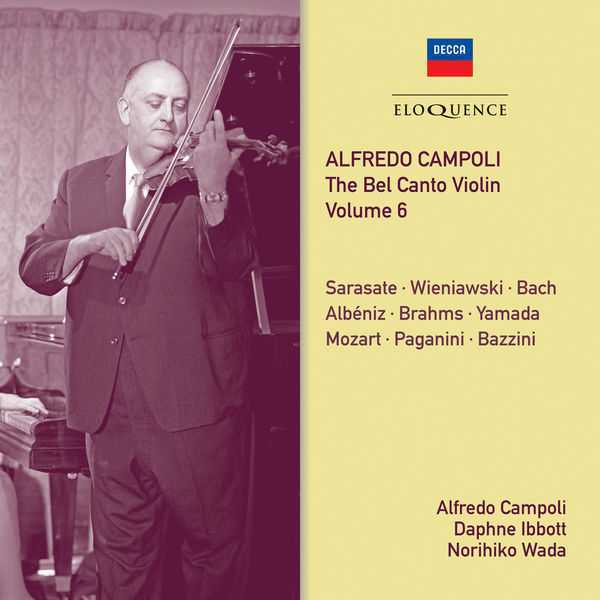
Performer: Alfredo Campoli, Daphne Ibbott, Belinda Bunt, Norihiko Wada
Format: FLAC (tracks)
Label: Decca
Catalogue: ELQ4825135
Release: 2018
Size: 675 MB
Recovery: +3%
Scan: cover
Sarasate: Danzas Españolas, Op.21
01ю 1. Malagueña
02. 2. Habañera
Sarasate: Danzas Españolas, Op.22
03. 1. Romanza Andaluza
04. 2. Jota Navarra
Sarasate: Danzas Española, Op. 23
05. 1. Playera
06. 2. Zapateado
Sarasate: Danzas Españolas, Op.26
07. 1. Vito
08. 2. Habañera
09. Sarasate: Navarra, Op. 33
Albéniz: España, Op.165 – Arr. Dushkin
10. 2. Tango
Brahms: Waltzes, Op. 39
11. No.15 in A flat
Bach: Concerto for Harpsichord, Strings, and Continuo No.5 in F minor, BWV 1056 – Arr. Johann Franco
12. Arioso
13. Schubert: Ave Maria, D839
14. Yamada: Red dragonfly (Arr. Campoli)
15. Yanada: Jogashima no ame
Mozart: Serenade in D, K.250 “Haffner” – Arr. Fritz Kreisler
16. 4. Rondo (Allegro)
Paganini: Violin Concerto No. 2 in B minor, Op. 7 ‘La Campanella’
17. 3. Rondo “La Campanella”
Paganini: 24 Caprices for Violin, Op.1 – Arr. F. Kreisler
18. Caprice No. 13, Op. 1
19. Caprice No. 20, Op. 1
20. Bazzini: La Ronde des lutins, Op. 25
21. Wieniawski: Polonaise de concert, Op.4
22. Wieniawski: Légende in G minor, Op. 17
Wieniawski: Two Mazurkas, Op.19
23 1. Obertass
24. 2. Le ménétrier (Dudziarz)
25. Wieniawski: Souvenir de Moscou, Op. 6
26. Wieniawski: Scherzo-Tarantelle in G minor, Op. 16
Wieniawski: Romance from Violin Concerto No.2 in D minor, Op.22 – Arr. violin & piano
27. 2. Romance
28. Wieniawski: Capriccio Valse in E major, Op. 7
29. Wieniawski: Polonaise Brillante No.2, Op.21
One of the most significant violinists in gramophone history, Alfredo Campoli enjoyed tremendous success in the 1930s as a purveyor of light music, both in concerts with his own salon orchestra and on Decca. A series of six 2CD reissues from Eloquence focuses on the violinist’s postwar reinvention of himself as ‘Campoli’, the classical soloist. The sixth volume of ‘The Bel Canto Violin’ gives a first international CD release on Decca to the violinist’s final recording for the label after half a century of best-selling albums. This features the music of the Polish violinist- composer Henryk Wieniawski, whose star has fallen since the passing of Romantic-style violinists such as Campoli.
Almost 72 years old when he made this record for L’Oiseau-Lyre in August 1978, but often practising for seven hours a day, he could still turn on the charm for a wistful tone-poem such as the Légende, wear the grand manner in showpieces such as the Souvenir de Moscou and present transcendent virtuosity in the Polonaise brillante. This collection opens with another L’Oiseau-Lyre album made late in his long career, and of another violinist- composer, Pablo de Sarasate. This offers not the usual run of Carmen Fantasy and Zigeunerweisen but the once fashionable set of eight Danzas españolas. Like Sarasate and Wieniawski, Campoli recognized no boundary between high and popular art: ‘Although I enjoy doing the lighter stuff,’ he told Gramophone in 1939, ‘my heart and soul are in the music of the finer type. I am convinced that one can make a success of both.’ So he did; the third album reissued here is a Decca recital of encores, recorded while Campoli was touring Japan in July 1966, after three months performing across Australia. Thus, alongside display items such as Bazzini’s Ronde des Lutins – dispatched with inimitable finesse – there are two arrangements of Japanese folksongs, Red Dragonfly and The Rain on Jogashima.
All the recordings in this series of ‘Alfredo Campoli: The Bel Canto Violin’ have been given new remasterings from original Decca sources. Invaluable context on both artist and repertoire is provided by new booklet essays from Campoli’s biographer David Tunley. ‘Campoli, who is excellently recorded, is on precisely the right wavelength, leaving us in no doubt of how difficult these works are to play and yet, paradoxically, making it all sound easy.’ Gramophone, August 1977 (Sarasate) ‘Campoli understands the gypsy style to the manner born and his timbre is sweet, his intonation true. He is not the man for unrestrained hyperbole, yet the moto perpetuos are effortless.’ Gramophone, June 1993 (Sarasate) ‘There is no need to make allowances for the ravages of time; if indeed there are any ravages they have not reached the fingers or the bow or the intonation, all of which give the impression that playing Wieniawski is the easiest thing in the world. The lyrical sections of the music go warm-heartedly, the virtuoso sections go elegantly; nowhere are standards less than the very best.’ Gramophone, August 1973 (Wieniawski)